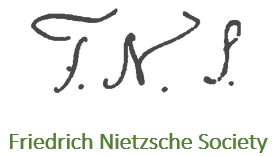27th International Conference of the Friedrich Nietzsche Society
Science, Art, Life
Hosted by Dr. Ashley Woodward and Dr. Amélie Berger Soraruff (University of Dundee)
Dalhousie Building
University of Dundee, Scotland
16-17 September 2022
Keynote Presenters
Dr. Rebecca Bamford (Queens University, Belfast)
Dr. Tsarina Doyle (National University of Ireland)
Dr. Gregory Moore (Georgia State University)
Dr. Tsarina Doyle (National University of Ireland)
Dr. Gregory Moore (Georgia State University)
REGISTRATION CLOSED
Nietzsche asserts that ‘a higher culture must give to man a double-brain, as it were two brain-ventricles, one for the perceptions of science, the other for those of non-science: lying beside one another, not confused together, separable, capable of being shut off; this is a demand of health.’ (HAH 251). This demand of health indicates that both science and art should be subject to a higher standard of value, the existential value of life. In his latter preface to The Birth of Tragedy, Nietzsche decribes the aim of the book as to examine science through the lens of art, and art through the lens of life. This broaches the question of the priorities given to these tendencies, which do not remain constant throughout the itinerary of Nietzsche’s thought. Nietzsche’s diagnosis of the nihilism of the modern age is in a certain sense a bemoaning of the rise of science and the decline of tragic art. Yet he also diagnosed decadent cultural tendencies, for example in the works of Wagner, to which science might be an antidote. Moreover, following his close reading of Lange’s History of Materialism he kept abreast with developments and debates in the natural sciences. His arguments for will to power and eternal return are indebted to scientific theories in atomism and thermodynamics, yet he never lost his profound sensitivity to music and to art in general, seeing it as an essential stimulus to life.
Questions of the relation between science and art remain at the forefront of debate today. Our natural sciences are having effects more profound than ever on the meaning and quality of our lives, from what some see as the physical instantiation of metaphysics in networked information and communication technologies, to the unintended consequences of the technosciences, the destruction of the environment and the threat of extinction it brings. Meanwhile, the very distinctions between the human and the natural sciences, between the sciences and the arts, have been increasingly questioned, and contemporary philosophy finds itself in greater dialogue with the sciences than in much of the twentieth century. This themed conference then invites a timely reflection on Nietzsche’s untimely meditations concerning the tensions, connections, resonances, and aporias of thinking science, art, and life together. Papers need not address all three themes, but should address the intersections or tensions between at least two of science (both Wissenschaft broadly conceived and natural science), art, and life in Nietzsche’s works.
Questions of the relation between science and art remain at the forefront of debate today. Our natural sciences are having effects more profound than ever on the meaning and quality of our lives, from what some see as the physical instantiation of metaphysics in networked information and communication technologies, to the unintended consequences of the technosciences, the destruction of the environment and the threat of extinction it brings. Meanwhile, the very distinctions between the human and the natural sciences, between the sciences and the arts, have been increasingly questioned, and contemporary philosophy finds itself in greater dialogue with the sciences than in much of the twentieth century. This themed conference then invites a timely reflection on Nietzsche’s untimely meditations concerning the tensions, connections, resonances, and aporias of thinking science, art, and life together. Papers need not address all three themes, but should address the intersections or tensions between at least two of science (both Wissenschaft broadly conceived and natural science), art, and life in Nietzsche’s works.
Accommodation in Dundee
For information about accommodation in the Dundee area, please click here.
Traveling to the University of Dundee
For information about traveling to the University of Dundee, please click here.
The 2022 FNS Conference is proudly supported by the Scots Philosophical Association and the British Society for the History of Philosophy.
Image: public domain, copyright Sharon Pittaway




